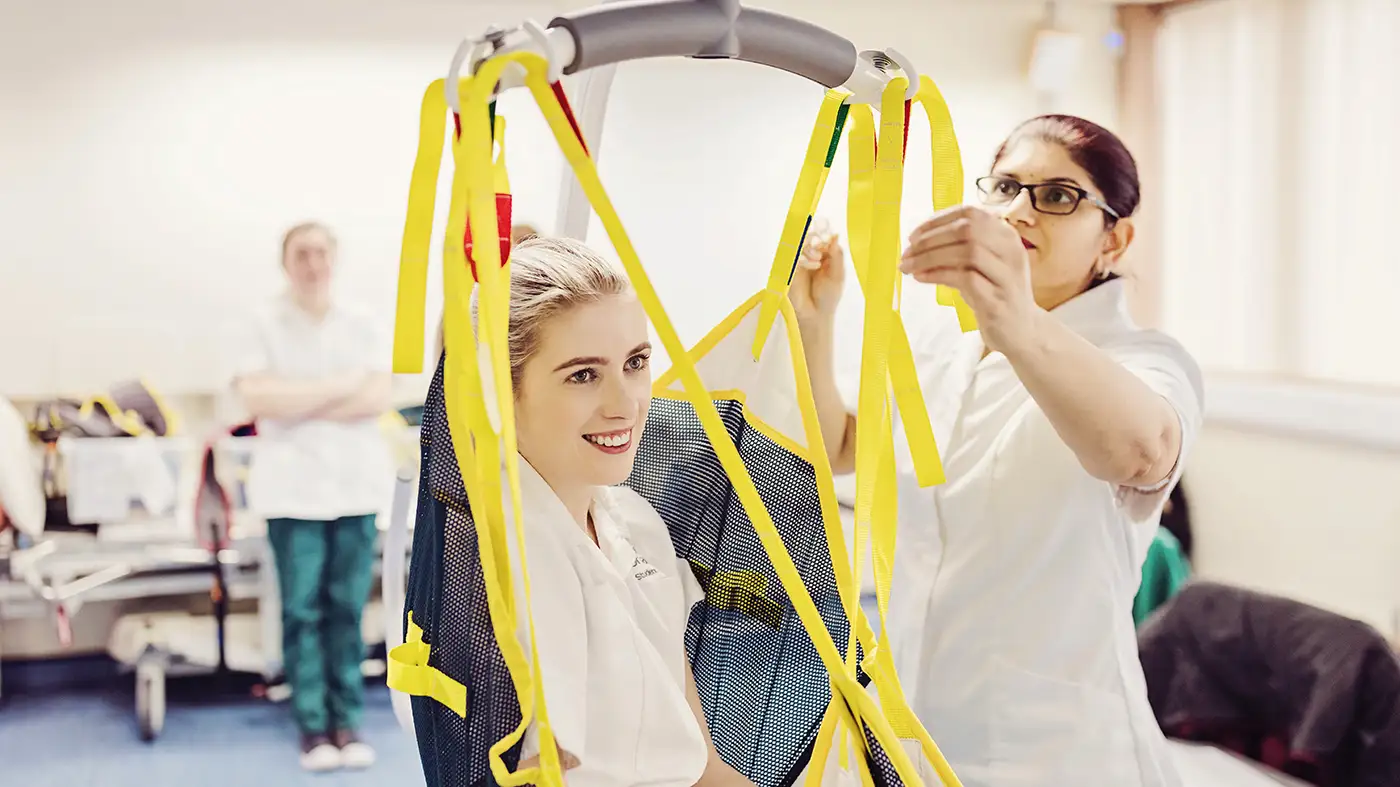
What is Occupational Therapy?
Occupational Therapy is a highly rewarding career path but what does it entail?
Occupational Therapy supports people to engage in activities they enjoy doing or perform tasks they would like to do, in order to live a fulfilling, enjoyable life. This can involve adapting a task using equipment or re-learning skills lost as a result of injury or a health condition. A holistic approach is crucial when working with service users, taking into account their physical, social, psychological, and environmental needs. Occupational Therapists tailor the best possible treatment plan for each individual.
Among other things, Occupational Therapists support people with:
- Participating in leisure activities
- Achieving self-care tasks such as bathing and dressing
- Performing domestic activities such as housework
- Returning to work or adapting activities to carry out a job role
- Skills involved in cooking and eating a meal
As an Occupational Therapist (OT) you will provide practical support to people who have difficulty managing everyday activities. This could be due to injury, disability, illness, or old age and you may provide specific tools to assist their progress.
You will be a problem solver, someone who can provide solutions and help a person improve their daily function.
Your professional intervention will have an incredibly positive influence on the patient’s resilience and overall health and wellbeing.
Who does an Occupational Therapist work with?
OTs support people with a wide range of conditions and abilities, of all ages and from all walks of life. They work with service users in a variety of settings, including hospitals, residential care, schools, at home, or in clinic environments. Let’s break it down further and explore who you could be working with as a qualified Occupational Therapist.
Children and young people
An Occupational Therapist can support a child or young person by using play and other activities to develop skills and fulfil their potential. This could take the form of fine motor activities to improve handwriting or practice with self-care tasks and social skills.
People with Learning Disabilities
As an Occupational Therapist, you may be in a position to help people with learning disabilities overcome environmental or social barriers that hinder them from living as independently as possible. You could support service users to use public transport with confidence, sustain employment or prepare a meal for their families.
Older Adults
An OTs support can be invaluable to older adults in a variety of settings such as their own homes, residential care, or hospital environments. By putting tailored solutions into place, OTs help older adults remain active for as long as possible. You could be providing advice and/or equipment to manage daily activities at home or supporting someone to improve their mobility or dexterity by engaging in hobbies and exercise within their local community.
People with Physical Disabilities
Occupational Therapists assess individual needs, agree to achievable goals and implement treatment plans to overcome challenges presented by a physical disability. This involves working closely with your client to build their self-confidence, introducing strategies to cope with specific problems, and advising on home or workplace modifications and the provision of specialist equipment, if needed.
People who experience mental health problems
OTs support people living with a wide range of mental health problems to reach their goals and move closer to recovery. Whether they are struggling to participate in work or home life, as an OT you will work at their pace, aiming to make positive changes in their daily routine and help them to overcome barriers.
Your process as an Occupational Therapist
Before we proceed to outline the skills and qualifications you will need to be an Occupational Therapist, let’s explore an average day in the life of an OT.
A Fictional Case Study
Richard, 43, sustained a severe leg fracture following a road traffic collision. Having undergone extensive surgery, he was referred to Occupational Therapy whilst in hospital. Richard’s vulnerable condition meant that he would no longer be able to sleep in his upstairs bedroom. Richard would need help to wash and would be reliant on his wife for washing, toileting, dressing, and meal preparation.
Richard’s mood was low but he was determined to heal and get back to some semblance of normality. He wanted to regain his independence and help himself heal from his injuries.
A ward Occupational Therapist visited Richard and his wife to explain the role of OT and suggest they prepare by moving his bed downstairs. The OT provided advice on equipment so Richard could access the toilet and get in and out of bed safely. They also referred Richard to a community Occupational Therapist.
A community Occupational Therapist visited Richard at his home to carry out an initial assessment, during which the following tasks were carried out:
- A full assessment of Richard’s current physical and emotional state and an appraisal of his pre-accident ability to carry out daily tasks and activities.
- A chat about his main concerns and his short and long-term goals. What is preventing Richard from engaging in daily activities and how can he be supported to meet his goals?
- Observation of Richard carrying out self-care tasks.
- Development of a treatment plan that will help Richard meet his short and long-term goals, establishing what adaptations and modifications he will need in his home and workplace to meet said goals.
Following the appointment, the OT wrote up a report for the Local Authority and set the wheels in motion for Richard’s support plan. His plan would be regularly reviewed and updated until he was discharged from the service.
The Skills and Qualifications you will need to be an Occupational Therapist
Qualifications
Undergraduate
If you want to improve people's lives and help them achieve their goals, we’d advise you to embark on a three-year BSc (Hons) undergraduate degree in Occupational Therapy. Following this, you will need to register with the Health and Care Professions Council to practise as an OT.
For a more detailed breakdown of the University of Cumbria’s Occupational Therapy degree course, click here.
Our degree course has been specifically designed to equip you with the theoretical and practical skills and professional qualifications needed to become a practising accredited Occupational Therapist. You can expect to complete over 1,000 hours of practical placement time in a variety of settings, helping people from all walks of life. This, combined with a solid foundation in analytical and research skills and group work, will give you a solid grounding in Occupational Therapy.
Note that our degree course minimum entry requirement is 112-120 UCAS Tariff points.
Postgraduate
If you already possess a relevant undergraduate degree, you could complete a postgraduate diploma or master's in Occupational Therapy.
An Introduction to Occupational Therapy
There are opportunities to gain experience in Occupational Therapy before committing to a three-year degree course. For an initial flavour of what’s involved in the field, you could work as an Occupational Health Support Worker, helping OTs provide practical support for people in their care. Holding a social care qualification, like a level 2 or 3 Diploma in Health and Social Care, may be useful if you are considering this line of work. If you don’t have a specific social care qualification, a recruiter may ask for English and Maths GCSEs in grades A to C.
The Skills and Qualities you will need to be an Occupational Therapist
To work in health and social care, you will need to possess a range of skills and qualities to meet the requirements of the job:
- Compassion and empathy - these top the list for a very good reason. As an OT you will be supporting people with complex needs so you must have the capacity to understand and appreciate each individual’s circumstances.
- Communication and interpersonal skills - because OTs are expected to quickly build therapeutic relationships with the people in their care they must possess excellent verbal and oral communication skills. Having the ability to build a rapport shouldn’t be underestimated; that special connection will give patients the encouragement they need to meet their goals.
- Organisational skills - with a busy schedule and a full caseload, an OT must be organised if they are to fulfil their daily duties. They will make the best use of their time to arrange and attend appointments, complete administrative duties, and plan ahead.
- Patience - it’s important that an OT works at the pace of their patient. The ability to challenge behaviour in a gentle, empathetic manner will encourage relationship-building and help patients meet their goals.
- Team working skills - OTs rarely work alone. They will often refer to and liaise with other health professionals to ensure their patient is receiving the help they need.
- Problem Solving - great problem-solving skills are a prerequisite for every Occupational Therapist. If you can think on your feet and have a solution-focused mindset, you’ll succeed in this field.
- Enthusiasm - last, but certainly not least, enthusiasm is a key skill for any aspiring Occupational Therapist. A desire to help others is central to the OT ethos and if you have the ability to motivate and inspire, this could be the perfect role for you.
Occupational Therapy is a rewarding and empowering career and we hope this brief outline has inspired you to investigate it as a potential career path.
If you want to support people to live full and satisfying lives, then contact us for more information on our Occupational Therapy degree course, or click here.
Want to find out more?
You are ready to take that next step. Ready to make that life-changing decision and work towards your career goals. By downloading our prospectus you will have the world at your fingertips.
You can browse our 100+ unique course options and have access to finance and support information to get you started. Discover all of the courses available to you from Arts to Zoology – we’re excited to see what you choose.

.jpg)


.jpg)